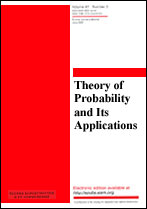|
|
Teoriya Veroyatnostei i ee Primeneniya, 1966, Volume 11, Issue 1, Pages 161–169
(Mi tvp576)
|
 |
|
 |
This article is cited in 15 scientific papers (total in 15 papers)
Short Communications
Some extremal problems in the queueing theory
B. A. Rogozin
Novosibirsk
Abstract:
The simplest queueing systems are considered. It is supposed that the periods of time between two succesive arrivals of the calls $\tau_1,\tau_2,\dots,\tau_n,\dots$ as well as the service times $\eta_1,\eta_2,\dots,\eta_n,\dots$ are independent identically distributed random variables, with $\eta_1,\eta_2,\dots,\eta_n$ being independent of $\tau_1,\tau_2,\dots,\tau_n,\dots$.
In the case of queueing systems it is established that when the usual conditions are satisfied, the distribution of $\tau_1$ is fixed and $\mathbf E\eta_1=\alpha$, the greatest lower bound of the expectation of the limit distribution of the waiting time $\mathbf EW$ is attained on the distribution $\mathbf P\{\eta_1=\alpha\}=1$. The similar question concerning $\mathbf EW$ is considered when the distribution of $\eta_1$ is fixed and $\mathbf E\tau_1=\beta$. Besides in the same situation an upper estimate for $\mathbf EW$ is given.
In the case of systems with losses of calls it is established that the extrema of the probability to be served when the distribution of $\tau_1$ is fixed and $\mathbf E\eta_1=\alpha$ is attained on, the distributions of $\eta_1$ such that $\mathbf P\{\eta_1=x_1\}+\mathbf P\{\eta_2=x_2\}=1$ for some $x_1\ge0$, $x_2\ge0$.
Received: 02.02.1965
Citation:
B. A. Rogozin, “Some extremal problems in the queueing theory”, Teor. Veroyatnost. i Primenen., 11:1 (1966), 161–169; Theory Probab. Appl., 11:1 (1966), 144–151
Linking options:
https://www.mathnet.ru/eng/tvp576 https://www.mathnet.ru/eng/tvp/v11/i1/p161
|


|




 Contact us:
Contact us: Terms of Use
Terms of Use
 Registration to the website
Registration to the website Logotypes
Logotypes








 Citation in format
Citation in format 
